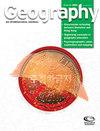Are ‘free-flowing rivers’ a good idea? The challenge of removing barriers from our rivers
IF 1.1
4区 社会学
Q2 GEOGRAPHY
引用次数: 0
Abstract
ABSTRACTThe removal of barriers from rivers is a controversial topic. Barriers come in many forms including weirs, dams, sluices and bridges. Mills are listed in the 11th-century Domesday Book and shown on early Ordnance Survey (OS) maps, often with their use marked ‘corn’, etc. So, what are the arguments for removing them? As this article shows, these relate to the creation of more natural flow regimes and the re-establishment of a connection between the river channel and the floodplain. The most obvious practical benefit is that migratory fish will find their upstream passage easier. The disbenefits are provision of access for invasive species and the loss of flood control structures. On the River Rother in West Sussex, UK, the release of sediments stored behind weirs is a potential ecological hazard. In Britain, few barriers have been removed and instead fish ladders have been installed. In the USA and Europe, dam removal is well advanced. The European Commission (EC, 2020) aims to achieve 25,000km of ‘free-flowing rivers’ by 2030 with a focus on removing ‘obsolete barriers’.“自由流动的河流”是个好主意吗?消除河流障碍的挑战
摘要河流堤防的拆除是一个有争议的话题。障碍物有多种形式,包括堰、坝、闸和桥。磨坊被列在11世纪的《末日审判书》中,并显示在早期的地形测量(OS)地图上,通常用“玉米”等标记它们的用途。那么,移除它们的理由是什么呢?正如本文所示,这些都与创造更自然的流动模式和重建河道与洪泛区之间的联系有关。最明显的实际好处是洄游鱼类会更容易逆流而上。其不利之处是为入侵物种提供了通道和防洪结构的丧失。在英国西萨塞克斯的罗瑟河上,储存在堰后的沉积物释放是一种潜在的生态危害。在英国,几乎没有拆除障碍物,而是安装了鱼梯。在美国和欧洲,大坝拆除工作进展顺利。欧盟委员会(EC, 2020)的目标是到2030年实现2.5万公里的“自由流动的河流”,重点是消除“过时的障碍”。
本文章由计算机程序翻译,如有差异,请以英文原文为准。
求助全文
约1分钟内获得全文
求助全文
来源期刊

Geography
GEOGRAPHY-
CiteScore
1.70
自引率
21.40%
发文量
21
期刊介绍:
An international journal, Geography meets the interests of lecturers, teachers and students in post-16 geography.
 求助内容:
求助内容: 应助结果提醒方式:
应助结果提醒方式:


